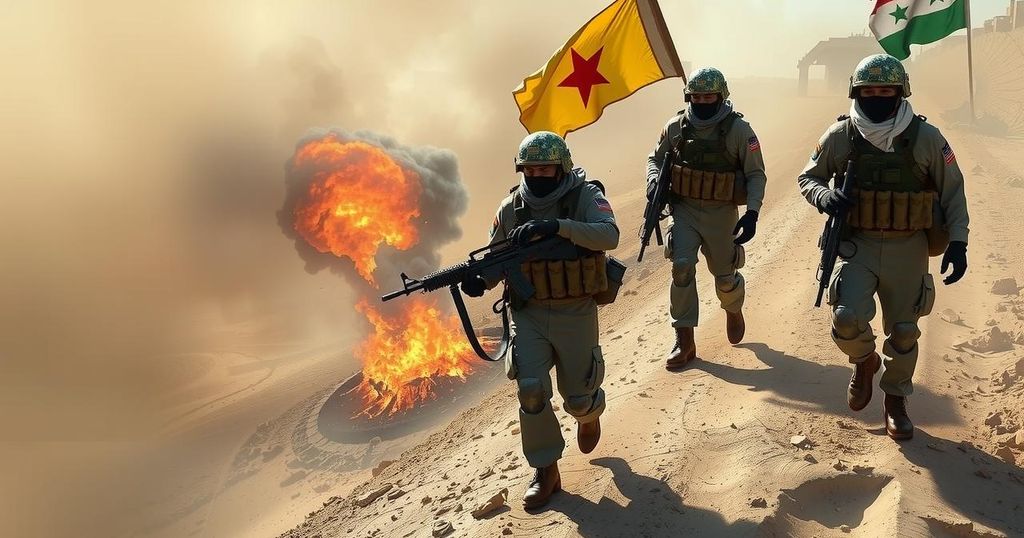Hezbollah’s strength has significantly decreased following the ousting of Bashar Assad in Syria, disrupting key supply lines and compromising its military capabilities. The group’s inability to support Assad during the insurgent offensive further highlights its vulnerabilities. This power shift is expected to shape Lebanon’s political landscape, with growing calls for Hezbollah to disarm and refocus on internal matters rather than regional conflicts. Analysts warn of considerable repercussions, including increased insecurity in the region.
The fall of former Syrian President Bashar Assad has left Hezbollah in a precarious position, as the militant group based in Lebanon is already weakened from previous confrontations. Hezbollah’s inability to support Assad during the insurgent offensive has significantly diminished its military capabilities and strategic strength. The departure of Assad, who maintained strong ties with Iran, has severed a critical supply line that Hezbollah depended on for weapons and military support, hampering its recovery prospects.
Despite the challenges, Hezbollah officials remain resolute. Hassan Fadlallah, a lawmaker aligned with the group, emphasized this, stating, “Whatever is happening in Syria, despite its dangers, will not weaken us.” Analysts warn that Hezbollah’s reduced power could have significant implications for Lebanon’s political landscape and Iran’s influence in the region, particularly in light of the shifting dynamics and the increased vulnerability of the group in relation to Israel.
Historically, the Assad regime provided vital support to Hezbollah since its inception in the 1980s, serving as a conduit for Iranian arms and a training ground for militants. In the past, Hezbollah’s support for Assad during the Syrian civil war reinforced its status, but recent losses—exacerbated by Israeli airstrikes—have left it struggling to maintain its influence. The recent shift in power dynamics, as remarked by Lt. Col. Fares al-Bayoush, signifies the end of Iran’s arms corridor in the region.
Hezbollah’s diminished strength offers the Lebanese army the opportunity to reclaim control, especially in southern areas previously dominated by the group. This situation contributes to increasing calls within Lebanon for Hezbollah’s disarmament and transformation into a purely political entity, as stated by Samir Geagea, leader of the Lebanese Forces Party: “To Hezbollah, it’s game over.”
The local sentiment towards Hezbollah has soured due to the extensive damage endured during conflicts with Israel and the resulting human and economic toll. Many Lebanese citizens perceive Hezbollah’s actions as contradicting its original mandate of defending Lebanon, leading former allies to reassess their relationships with the group. There is a growing expectation that Hezbollah may need to refocus its ambitions to address internal matters and stabilize Lebanon’s political climate.
With Assad’s fall, Iran’s influence in the region is expected to wane, reducing Hezbollah’s operational capabilities significantly. Experts suggest that while Hezbollah might still engage in limited smuggling operations for supplies, these endeavors will not equate to the logistical support they previously received from Syria. The ramifications of this power shift extend to Israel, which remains cautious of the outcome among insurgent groups that have emerged in the vacuum left by Assad, signaling a transformative period in Middle Eastern geopolitics.
The article discusses the implications of the toppling of Bashar Assad in Syria on Hezbollah, the Lebanon-based militant group that has historically relied on Assad’s regime for support. It examines how the loss of Assad has compromised Hezbollah’s military capabilities by cutting off crucial supply lines for arms and training, turning the group’s situation precarious. Additionally, it highlights the political ramifications for Hezbollah within Lebanon and its relationships with local factions, particularly as public sentiment shifts in light of their current vulnerabilities and past actions.
In summary, the removal of Bashar Assad from power has severely weakened Hezbollah, disrupting its vital connections to both military resources and political authority in Lebanon. The group’s inability to support Assad underscores its fragility, with potential shifts in the regional balance of power affecting its operations. As Hezbollah navigates this new reality, calls for its disarmament and a return to a purely political role are becoming more pronounced, reflecting a significant transformation in Lebanese and Middle Eastern dynamics.
Original Source: abcnews.go.com







